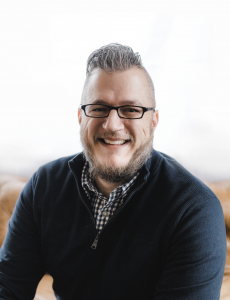Teletherapy in a COVID-19 World
Teletherapy in a COVID-19 World
Categories: WEEKLY DEVOTIONALS
Teletherapy in a COVID-19 World

I don’t know about you, but over these past four weeks, I’ve been stretched and challenged in ways that I never expected. When I was a clinical mental health master’s student at Denver Seminary, I remember a professor telling me to embrace the ambiguity, which seemed like an ambiguous statement to me (insert sarcasm here).
Now, as a professor at Colorado Christian University in the Clinical Mental Health Master’s Program, I too, challenge my students to “embrace the process,” which often elicits strong emotions. But here I am, here we are, having to take my own advice, and let’s be really honest. IT STINKS! IT’S HARD! IT’S FRUSTRATING! Most of us did not enter into this profession to be a tele-therapist. We chose to be in this field to sit with clients in our office. We were trained to do face-to-face therapy, to spot body language, non-verbal cues, to read emotions, and the energy in the room. We were trained to develop relationships, to create treatment plans, to set goals and objectives, and to use techniques. We were NOT trained to do teletherapy. But here we are. So, what do we do? We either sink or swim. I, for one, have chosen to swim!
I am the Founder and CEO of Mayfield Counseling Centers, a 501c3 non-profit counseling organization in Colorado Springs, Colorado. I have the privilege of leading a team of 32 individuals, which consists of 24 counselors, six interns, and two support staff. In 2019 we scheduled nearly 20,000 appointments, which roughly translates to 80 appointments per week per therapist. Four weeks ago, we made the decision to transition everything online. Yes, it was a process and was a big challenge, but we made it work! Here is what we did:
- Purchased a HIPAA secure, compliant, and encrypted video platform for the team: There are many good ones out there, but I wanted the best. I consulted with two cyber-security individuals and we determined that the ZOOM Healthcare was the best platform. I realize that there is a lot of bad press with ZOOM, but that was the public version. The healthcare version is more secure, and we have required our staff to create and use a password with every link sent out.
- Created a teletherapy goodness of fit questionnaire and teletherapy disclosure: Teletherapy is not for everyone and because we are considered an essential business, we could see someone in the office if we needed too. Instead of creating this ourselves, we chose to utilize our mental health lawyers.
- Developed a way for your team to communicate virtually: We like using Slack. Slack is a business chat platform that allows you to communicate via their app. It cuts down on texts and allows the team to communicate freely throughout the day or night.
- Inspect the staff’s virtual office: Just because you are doing therapy out of your home, doesn’t mean quality must suffer. We required our team to create their home office and then have one of our directors jump on a ZOOM call to see how it felt. Remember, confidentiality still applies!
- Be more intentional with social media: We’ve expanded our social media significantly and are posting daily. We’ve also created several new shows, “The Mental Health Minute” and the “Mental Health Quarantine Show.” These are two examples of shows that provide applicable mental health tips for those watching in our community!
Personally, I think the mental health field is often late to the party when it comes to the utilization of technology. However, whether you like it or not, this is the wave of the future. Counseling centers and private practices must embrace change and get creative if they hope to be successful and relevant in a post COVID-19 world. People need our care and expertise, let’s rise to the challenge!
 Mark Mayfield, Ph.D., LPC, is an author, speaker, counselor, professor, and suicide survivor. He has extensive experience with adolescents and families, focusing on self-injury and suicidality. Dr. Mayfield is currently the Founder and CEO of Mayfield Counseling Centers in Colorado Springs, Colorado, which serves nearly 20,000 appointments a year. He is a contributing author to several magazines and Web sites. His first book, Help! My Teen is Self-injuring: A Crisis Manual for Parents, will be available by the end of February 2020 through Focus on the Family. His second book, The Loneliness Epidemic, will be available in the fall of 2021 through NavPress
Mark Mayfield, Ph.D., LPC, is an author, speaker, counselor, professor, and suicide survivor. He has extensive experience with adolescents and families, focusing on self-injury and suicidality. Dr. Mayfield is currently the Founder and CEO of Mayfield Counseling Centers in Colorado Springs, Colorado, which serves nearly 20,000 appointments a year. He is a contributing author to several magazines and Web sites. His first book, Help! My Teen is Self-injuring: A Crisis Manual for Parents, will be available by the end of February 2020 through Focus on the Family. His second book, The Loneliness Epidemic, will be available in the fall of 2021 through NavPress
